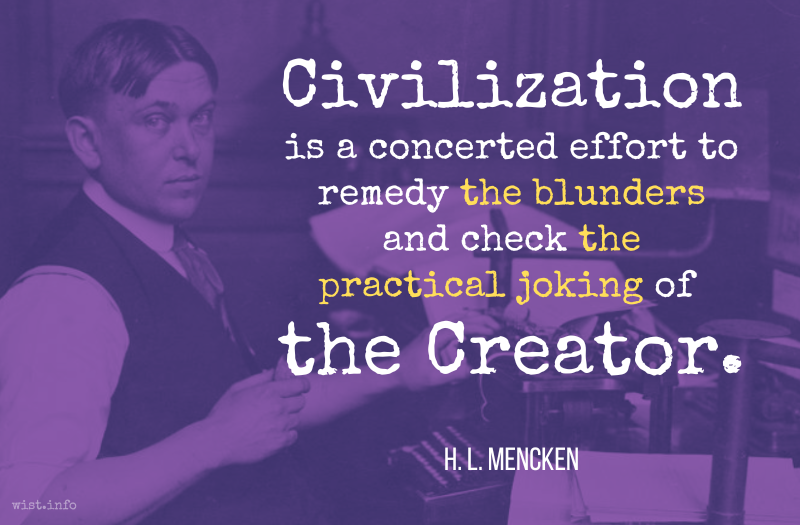I could no longer reconcile the claims of faith with the facts of life. In particular, I could no longer explain how there can be a good and all-powerful God actively involved with this world, given the state of things. For many people who inhabit this planet, life is a cesspool of misery and suffering. I came to a point where I simply could not believe that there is a good and kindly disposed Ruler who is in charge of it.
Quotations about:
theodicy
Note not all quotations have been tagged, so Search may find additional quotes on this topic.
If there is an all-powerful and loving God in this world, why is there so much excruciating pain and unspeakable suffering? The problem of suffering has haunted me for a very long time. It was what made me begin to think about religion when I was young, and it was what led me to question my faith when I was older. Ultimately, it was the reason I lost my faith.
Bart D. Ehrman (b. 1955) American Biblical scholar, author
God’s Problem, ch. 1 “Suffering and a Crisis of Faith” (2008)
(Source)
People complain about the bad things that happen to em that they don’t deserve but they seldom mention the good. About what they done to deserve them things. I don’t recall that I ever give the good Lord all that much cause to smile on me. But he did.
Cormac McCarthy (1933-2023) American novelist, playwright, screenwriter
No Country for Old Men, ch. 4 (2005)
(Source)
And I have known small cities, who revere
The Gods, made subject to unrighteous power,
Vanquish’d by spears more numerous.[πόλεις τε μικρὰς οἶδα τιμώσας θεούς,
αἳ μειζόνων κλύουσι δυσσεβεστέρων
λόγχης ἀριθμῷ πλείονος κρατούμεναι.]Euripides (485?-406? BC) Greek tragic dramatist
Bellerophon [Βελλεροφῶν], frag. 286 (TGF) (c. 430 BC) [tr. Wodhull (1809)]
(Source)
Nauck (TGF) frag. 286, Barnes frag. 8, Musgrave frag. 25. (Source (Greek)). Alternate translations:
I know too of small cities doing honour to the gods which are subject to larger, more impious ones, because they are overcome by a more numerous army.
[tr. Collard, Hargreaves, Cropp (1995)]
I see minor states that honor gods subject to greater ones that revere none, for ‘might is right’.
[tr. Stevens (2012)]
I know small cities honouring the gods that obey larger and more impious ones since they are outnumbered in spearmen.
[tr. Dixon (2014)]
I know that small cities honor the gods,
Cities that obey stronger more impious men
Because they are overpowered by the strength of their arms.
[tr. @sentantiq (2015)]
I know of small cities where the gods are honored: yet these same cities are forced to comply with the demands of impious men in larger cities, overpowered by the sheer magnitude of their armament.
[tr. Emerson]
Doth any man assert that there are Gods
In Heaven? I answer there are none: let him
Who contradicts me like a fool, no longer
Quote ancient fables; but observe the fact,
Nor to my words give credence. Kings, I say.
Kill many, but rob more of their possessions.
And violating every sacred oath,
Lay waste whole cities; yet, tho’ they act thus,
Are more successful far than they who lead
In constant piety a tranquil life.[φησίν τις εἶναι δῆτ’ ἐν οὐρανῷ θεούς;
οὐκ εἰσίν, οὐκ εἴσ’, εἴ τις ἀνθρώπων θέλει
μὴ τῷ παλαιῷ μῶρος ὢν χρῆσθαι λόγῳ.
σκέψασθε δ’ αὐτοί, μὴ ἐπὶ τοῖς ἐμοῖς λόγοις
γνώμην ἔχοντες. φήμ’ ἐγὼ τυραννίδα
κτείνειν τε πλείστους κτημάτων τ’ ἀποστερεῖν
ὅρκους τε παραβαίνοντας ἐκπορθεῖν πόλεις·
καὶ ταῦτα δρῶντες μᾶλλόν εἰσ’ εὐδαίμονες
τῶν εὐσεβούντων ἡσυχῇ καθ’ ἡμέραν]Euripides (485?-406? BC) Greek tragic dramatist
Bellerophon [Βελλεροφῶν], frag. 286 (TGF) (c. 430 BC) [tr. Wodhull (1809)]
(Source)
Nauck (TGF) frag. 286, Barnes frag. 8, Musgrave frag. 25. (Source (Greek)). Alternate translations:
Doth some one say that there be gods above?
There are not; no, there are not. Let no fool,
Led by the old false fable, thus deceive you.
Look at the facts themselves, yielding my words
No undue credence: for I say that kings
Kill, rob, break oaths, lay cities waste by fraud,
And doing thus are happier than those
Who live calm pious lives day after day. All divinity
Is built-up from our good and evil luck.
[tr. Symonds (1876)]
Does someone say there are indeed gods in heaven? There are not, there are not, if a man is willing not to rely foolishly on the antiquated reasoning. Consider for yourselves, do not base your opinion on words of mine. I say myself that tyranny kills very many men and dprives them of their possessions; and that tyrants break their oaths to ransack cities, and in doing this they are more prosperous under heaven than men who live quietly in reverence.
[tr. Collard, Hargreaves, Cropp (1995)]
Does anyone assert that there are gods in heaven? There are not, no, there are not, if a man is ready not to swallow whole the old tales. Think it through yourselves, do not make my words the foundation of your opinion. I declare that tyranny kills many, robs them, that tyrants break their oaths to plunder cities, yet in this they prosper more than those whose unassuming habit is true piety.
[tr. Stevens (2012)]
Does anyone say there are gods in heaven? There are not, there are not, unless one wishes to follow ancient wisdom like a fool. [...] I say that tyranny kills many people, deprives possessions, circumvents oaths, and plunders cities. And even though they do these things, they are more fortunate than those living piously day to day in peace.
[tr. Dixon (2014)]
Is there anyone who thinks there are gods in heaven?
There are not. There are not, for any man who wishes
Not to be a fool and trust some ancient story.
Look at it yourselves, don’t make up your mind
Because of my words. I think that tyranny
Kills so many men and steals their possessions
And that men break their oaths by sacking cities.
But the men who do such things are more fortunate
Than those who live each day piously, at peace.
[tr. @sentantiq (2015)]
People ask: Do gods really exist in heaven? No, they do not exist, they really don’t; if any of mankind wishes to avoid being the sort of fool who follows the ancient story. Consider it for yourselves, don’t take my word for it. I say that tyranny destroys multitudes and confiscates their possessions; oath-breakers sack cities; and yet, those who do such things are far more prosperous than those who, day by day, live devoutly and in peace.
[tr. Emerson]
Civilization is a concerted effort to remedy the blunders and check the practical joking of the Creator.
H. L. Mencken (1880-1956) American writer and journalist [Henry Lewis Mencken]
A Little Book in C Major, ch. 2, § 2 (1916)
(Source)
Because
He is all-powerful, must all-good, too, follow?
I judge but by the fruits — and they are bitter —
Which I must feed on for a fault not mine.
THE LORD
And do you have no other news?
Do you come always only to accuse?
Does nothing please you ever on the earth?MEPHISTOPHELES
No, Lord! I find it still of precious little worth.
I feel for mankind in their wretchedness,
It almost makes me want to plague them less.DER HERR
Hast du mir weiter nichts zu sagen?
Kommst du nur immer anzuklagen?
Ist auf der Erde ewig dir nichts recht?MEPHISTOPHELES
Nein Herr! ich find es dort, wie immer, herzlich schlecht.
Die Menschen dauern mich in ihren Jammertagen,
Ich mag sogar die armen selbst nicht plagen.Johann Wolfgang von Goethe (1749-1832) German poet, statesman, scientist
Faust: a Tragedy [eine Tragödie], Part 1, sc. 3 “Prologue in Heaven,” l. 301ff (1808-1829) [tr. Arndt (1976)]
(Source)
(Source (German)). Alternate translations:
THE LORD
You've nothing more to say to me?
You come but to complain unendingly?
Is never aught right to your mind?
MEPHISTOPHELES
No, Lord! All is still downright bad, I find.
Man in his wretched days makes me lament him;
I am myself reluctant to torment him.
[tr. Priest (1808)]
THE LORD
Have you no more to say. Do you come here
Always to scold, and cavil, and complain?
Seems nothing ever right to you on earth?
MEPHISTOPHELES
No, Lord! I find all there, as ever, bad at best.
Even I am sorry for man's days of sorrow;
I could myself almost give up the pleasure
Of plaguing the poor things.
[tr. Shelley (1815)]
THE LORD: Have you nothing else to say to me? Are you always coming for no other purpose than to complain? Is nothing ever to your liking upon earth?
MEPHISTOPHELES: No, Lord! I find things there, as ever, miserably bad. Men, in their days of wretchedness, move my pity; even I myself have not the heart to torment the poor things.
[tr. Hayward (1831)]
THE LORD
Hast thou naught else to say? Is blame
In coming here, as ever, thy sole aim?
Does nothing on the earth to thee seem right?
MEPHISTOPHELES
No, Lord! I find things there, as ever, in sad plight.
Men, in their evil days, move my compassion;
Such sorry things to plague is nothing worth.
[tr. Swanwick (1850)]
THE LORD
Hast nothing for our edification?
Still thy old work of accusation?
Will things on earth be never right for thee?
MEPHISTOPHELES
No, Lord! I find them still as bad as bad can be.
Poor souls! their miseries seem so much to please 'em,
I scarce can find it in my heart to tease 'em.
[tr. Brooks (1868)]
THE LORD
Hast thou, then, nothing more to mention?
Com'st ever, thus, with ill intention?
Find'st nothing right on earth, eternally?
MEPHISTOPHELES
No, Lord! I find things, there, still bad as they can be.
Man's misery even to pity moves my nature;
I've scarce the heart to plague the wretched creature.
[tr. Taylor (1870)]
THE LORD
Hast thou then nothing more to say?
And art thou here again to-day
To vent thy grudge in peevish spite
Against the earth, still finding nothing right?
MEPHISTOPHELES
True, Lord; I find things there no better than before;
I must confess I do deplore
Man’s hopeless case, and scarce have heart myself
To torture the poor miserable elf.
[tr. Blackie (1880)]
THE LORD
Is that the sum of thy narration?
Hast never aught but accusation?
Still upon Earth is nothing to thy mind?
MEPHISTOPHELES
No, Lord! all things on Earth still downright bad I find.
Mortals their piteous fate upon the rack so stretches,
Myself have scarce the heart to plague the wretches.
[tr. Latham (1908)]
THE LORD
Can you not speak but to abuse?
Do you come only to accuse?
Does nothing on the earth seem to you right?
MEPHISTO:
No, Lord. I find it still a rather sorry sight.
Man moves me to compassion, so wretched is his plight.
I have no wish to cause him further woe.
[tr. Kaufmann (1961)]
THE LORD
Is this all you can report?
Must you come forever to accuse?
Is nothing ever right for you on earth?
MEPHISTOPHELES
No, my Lord. I find it there, as always, thoroughly revolting.
I pity men in all their misery
and actually hate to plague the wretches.
[tr. Salm (1962)]
THE LORD
And that is all you have to say?
Must you complain each time you come my way?
Is nothing right in your terrestrial scene?
MEPHISTOPHELES
No, sir! The earth's as bad as it has always been.
I really feel quite sorry for mankind;
Tormenting them myself's no fun, I find.
[tr. Luke (1987)]
THE LORD
Is that all you have got to say to me?
Is that all you can do, accuse eternally?
Is nothing ever right for you down there, sir?
MEPHISTOPHELES
No, nothing, Lord -- all's just as bad as ever.
I really pity humanity's myriad miseries,
I swear I hate tormenting the poor ninnies.
[tr. Greenberg (1992)]
THE LORD
Why are you telling me all this again?
Do you always come here to complain?
Could there be something good on earth that you've forgotten?
MEPHISTOPHELES
No, Lord! I'm pleased to say it's still completely rotten.
I feel quite sorry for their miserable plight;
When it's as bad as that, tormenting them's not right.
[tr. Williams (1999), l. 293ff]
GOD
Have you nothing else to name?
Do you always come here to complain?
Does nothing ever go right on the Earth?
MEPHISTOPHELES
No, Lord! I find, as always, it couldn’t be worse.
I’m so involved with Man’s wretched ways,
I’ve even stopped plaguing them, myself, these days.
[tr. Kline (2003)]
Ripheus fell, a man
Most just of all the Trojans, most fair-minded.
The gods thought otherwise.[Cadit et Rhipeus, iustissimus unus
qui fuit in Teucris et servantissimus aequi:
dis aliter visum.]Virgil (70-19 BC) Roman poet [b. Publius Vergilius Maro; also Vergil]
The Aeneid [Ænē̆is], Book 2, l. 426ff (2.426) [Aeneas] (29-19 BC) [tr. Humphries (1951)]
(Source)
(Source (Latin)). Alternate translations:
Next Ripheus fell, most faithfull to his trust:
Nor in all Troy was known a man more just:
Though by the Gods otherwise look'd upon.
[tr. Ogilby (1649)]
Then Ripheus follow'd, in th' unequal fight;
Just of his word, observant of the right:
Heav'n thought not so.
[tr. Dryden (1697)]
Ripheus too falls, the most just among the Trojans, and of the strictest integrity; but to the gods it seemed otherwise.
[tr. Davidson/Buckley (1854)]
Then Rhipeus dies: no purer son
Troy ever bred, more jealous none
Of sacred right: Heaven's will be done.
[tr. Conington (1866)]
Next
Rhipeus, of all Trojans most upright
And just : -- such was the pleasure of the gods!
[tr. Cranch (1872), l. 580ff]
Rhipeus falls, the one man who was most righteous and steadfast in justice among the Teucrians: the gods' ways are not as ours.
[tr. Mackail (1885)]
Fell Rhipeus there, the heedfullest of right
Of all among the Teucrian folk, the justest man of men;
The Gods deemed otherwise.
[tr. Morris (1900)]
Next, Rhipeus dies, the justest, but in vain,
The noblest soul of all the Trojan train.
Heaven deemed him otherwise.
[tr. Taylor (1907), st. 57, l. 508ff]
Then Rhipeus fell;
we deemed him of all Trojans the most just,
most scrupulously righteous; but the gods
gave judgment otherwise.
[tr. Williams (1910)]
Ripheus, too, falls, foremost in justice among the Trojans, and most zealous for the right -- Heaven's will was otherwise.
[tr. Fairclough (1916)]
Then Rhipeus fell, he who of all the Trojans
Was most fair-minded, the one who was most regardful of justice:
God's ways are inscrutable.
[tr. Day Lewis (1952)]
Then Ripheus, too, has fallen -- he was first
among the Teucrians for justice and
observing right; the gods thought otherwise.
[tr. Mandelbaum (1971)]
And Ripheus fell,
A man uniquely just among the Trojans,
The soul of equity; but the gods would have it
Differently.
[tr. Fitzgerald (1981), l. 560ff]
Rhipeus also fell. Of all the Trojans he was the most righteous, the greatest lover of justice. But the gods made their own judgments.
[tr. West (1990)]
And Ripheus, who was the most just of all the Trojans,
and keenest for what was right (the gods’ vision was otherwise)
[tr. Kline (2002)]
Then Rhipeus,
Of all Teucrians the most righteous (but the gods
Saw otherwise) went down.
[tr. Lombardo (2005), l. 493ff]
Rhipeus falls too, the most righteous man in Troy,
the most devoted to justice, true, but the gods
had other plans.
[tr. Fagles (2006)]
It was easier for me to think of a world without a creator than of a creator loaded with all of the contradictions of the world.
Simone de Beauvoir (1908-1986) French author, existentialist philosopher, feminist theorist
Quoted in “Toward a Hidden God,” Time (8 Apr 1966)
(Source)
I am often inclined to be envious of other people’s religion. They are so cocksure dogmatically that they act as though they are omniscient. Life has no doubts, its direction is determined, all evil is by hypothesis overruled by an all-wise God for good. I do not share this view of life, any more than I share the Christian Science views of disease, but I can see that it makes people enthusiastic, effective, self-forgetful and often fanatical and great bores.
Henry Joel Cadbury (1883-1974) American biblical scholar, Quaker historian, writer, activist
“My Personal Religion,” lecture, Harvard School of Divinity (1936)
(Source)
Quite often, people who mean well will inquire of me whether I ever ask myself, in the face of my diseases, “Why me?” I never do. If I ask “Why me?” as I am assaulted by heart disease and AIDS, I must ask “Why me?” about my blessings, and question my right to enjoy them. The morning after I won Wimbledon in 1975 I should have asked “Why me?” and doubted that I deserved the victory. If I don’t ask “Why me?” after my victories, I cannot ask “Why me?” after my setbacks and disasters.
For the Father of agriculture
Gave us a hard calling: he first decreed it an art
To work the fields, sent worries to sharpen our mortal wits
And would not allow his realm to grow listless from lethargy […]
So thought and experiment might forge man’s various crafts
Little by little, asking the furrow to yield the corn-blade,
Striking the hidden fire that lies in the veins of flint.[Pater ipse colendi
haud facilem esse viam voluit, primusque per artem
movit agros curis acuens mortalia corda
nec torpere gravi passus sua regna veterno […]
ut varias usus meditando extunderet artis
paulatim et sulcis frumenti quaereret herbam.
Ut silicis venis abstrusum excuderet ignem.]Virgil (70-19 BC) Roman poet [b. Publius Vergilius Maro; also Vergil]
Georgics [Georgica], Book 1, l. 121ff (1.121-124, 133-135) (29 BC) [tr. Day-Lewis (1940)]
(Source)
Telling how Jupiter made life on earth miserable for farmers so as to encourage the development of useful arts and crafts.
(Source (Latin)). Alternate translations:
Nor was Jove pleas'd tillage should easie be:
And first commands with art to plough the soyle,
On mortall hearts imposing care, and toyle;
Nor lets dull sloth benumb men where he reigns [...]
That severall arts by labour might be found,
And men in furrows seek the grain that fell,
And hidden fire from veins of flint compell.
[tr. Ogilby (1649)]
The Sire of Gods and Men, with hard Decrees,
Forbids our Plenty to be bought with Ease:
And wills that Mortal Men, inur'd to toil,
Shou'd exercise, with pains, the grudging Soil.
Himself invented first the shining Share,
And whetted Humane Industry by Care:
Himself did Handy-Crafts and Arts ordain;
Nor suffer'd Sloath to rust his active Reign[...]
That studious Need might useful Arts explore;
From furrow'd Fields to reap the foodful Store:
And force the Veins of clashing Flints t' expire
The lurking Seeds of their Cœlestial Fire.
[tr. Dryden (1709), l. 183-190, 203-206]
Nor thou repine: great Jove, with tasks untry'd
To rouse man's pow'rs, an easier way deny'd;
And first bade mortals stir with art the plain,
Lest sloth should dim the splendors of his reign [...]
That gradual use might hew out arts from man,
That corn's green blade in furrows might be fought,
And from struck flints the fiery sparkle caught.
[tr. Nevile (1767), l. 147-150, 160-162]
Not to dull Indolence and transient Toil
Great Jove resign'd the conquest of the soil:
He sent forth Care to rouse the human heart,
And sharpen genius by inventive art:
Nor tamely suffer'd earth beneath his sway
In unproductive sloth to waste away. [...]
Jove will'd that use, by long experience taught,
Should force out various arts by gradual thought,
Strike from the flint's cold womb the latent flame,
And from the answering furrow nurture claim.
[tr. Sotheby (1800)]
The Sire himself willed the ways of tillage not to be easy, and first aroused the fields by art, whetting the skill of mortals with care; nor suffered he his reign to lie inactive in heavy sloth [...] that experience, by dint of thought, might gradually hammer out the various arts, in furrows seek the blade of corn, and form the veins of flint strike out the hidden fire.
[tr. Davidson (1854)]
Our heavenly Father hath not judged it right
To leave the road of agriculture light:
'Twas he who first made husbandry a plan.
And care a whetstone for the wit of man;
Nor suffer'd he his own domains to lie
Asleep in cumbrous old-world lethargy [...]
That practice might the various arts create,
On study's anvil, by laborious dint,
The plant of corn by furrows propagate,
And strike the fire that lurks in veins of flint.
[tr. Blackmore (1871), ll. 140-145, 154-157]
The wise Father of all willed not that the path of husbandry should be easy; he was the first to break up the earth by human skill, sharpening man's wit by the cares of life, nor suffering his own domains to lie asleep in cumbrous lethargy [...] in order that practice might by slow degrees hammer out art after art on the anvil of thought, might find the corn-blade by delving the furrow, and strike from veins of flint the fire that Jove had hid.
[tr. Wilkins (1873)]
The great Sire himself
No easy road to husbandry assigned,
And first was he by human skill to rouse
The slumbering glebe, whetting the minds of men
With care on care, nor suffering realm of his
In drowsy sloth to stagnate [...]
that use by gradual dint of thought on thought
Might forge the various arts, with furrow's help
The corn-blade win, and strike out hidden fire
From the flint's heart.
[tr. Rhoades (1881)]
For so great Jove, the sire of all, decreed,
No works save those that took us should succeed,
Nor wills his gifts should unimproved remain.
While man inactive slumbers on the plain. [...]
Man seeks for fire concealed within the veins
Of flints, and labour groans upon the plains;
Till, one by one, worked out by frequent thought,
Are crude inventions to perfection brought.
[tr. King (1882), ll. 123-126, 135-138ff]
Father Jove himself willed that the modes of tillage should not be easy, and first stirred the earth by artificial means, whetting the minds of men by anxieties; nor suffered he his subjects to become inactive through oppressive lethargy [...] in order that man’s needs, by dint of thought, might gradually hammer out the various arts, might seek the blade of corn by ploughing, and might strike forth the fire thrust away in the veins of the flint.
[tr. Bryce (1897)]
Our Lord himself willed the way of tillage to be hard, and long ago set art to stir the fields, sharpening the wits of man with care, nor suffered his realm to slumber in heavy torpor [...] that so practice and pondering might slowly forge out many an art, might seek the corn-blade in the furrow and strike hidden fire from the veins of flint.
[tr. Mackail (1899)]
The great Sire himself
No easy road to husbandry assigned,
And first was he by human skill to rouse
The slumbering glebe, whetting the minds of men
With care on care, nor suffering realm of his
In drowsy sloth to stagnate [...]
that use by gradual dint of thought on thought
Might forge the various arts, with furrow's help
The corn-blade win, and strike out hidden fire
From the flint's heart.
[tr. Greenough (1900)]
Allfather himself hath willed
That the pathway of tillage be thorny. He first by man's art broke
Earth's crust, and by care for the morrow made keen the wits of her folk,
Nor suffered his kingdom to drowse 'neath lethargy's crushing chain [...]
That Thought on experience' anvil might shape arts manifold,
And might seek in the furrow the blade that is pledge of the harvest's gold,
And smite from the veins of flint the fire-soul hidden there.
[tr. Way (1912)]
Great Jove himself ordained for husbandry
No easy road, when first he bade earth's fields
Produce by art, and gave unto man's mind
Its whetting by hard care; where Jove is king
He suffers not encumbering sloth to bide. [...]
He purposed that experience and thought
By slow degrees should fashion and forge out
Arts manifold, should seek green blades of corn
By ploughing, and from veins of flinty shard
Hammer the fire.
[tr. Williams (1915)]
The great Father himself has willed that the path of husbandry should not run smooth, who first made art awake the fields, sharpening men’s wits by care, nor letting his kingdom slumber in heavy lethargy [...] so that experience, from taking thought, might little by little forge all manner of skills, seeking in ploughed furrows the blade of corn, striking forth the spark hidden in the veins of flint.
[tr. Fairclough (Loeb) (1916)]
The Father willed it so: He made the path
Of agriculture rough, established arts
Of husbandry to sharpen wits,
Forbidding sloth to settle on his soil
[...] So that mankind
By taking thought might learn to forge its arts
From practice: seek to bring the grain from furrows,
Strike out the fire locked up in veins of flint.
[tr. Bovie (1956)]
Jupiter, father of the gods, decided himself
that the way of the farmer should not be an easy way.
He demanded craft; he tuned our nerves with worries;
he weeded lethargy from his human fields [...]
Thus men are supposed to have found the fire that hides
in the veins of flint. By clever meditation
experience elaborates to skill ...
One can see a triumph in it: the first furrow
sprouting a row of corn ....
[tr. Slavitt (1971)]
The father of cultivation himself did not want its way to be easy and wa first to change the fields by design, sharpening mortal wits with cares, not allowing his kingdoms to become sluggish with heavy old age [...] in order that experience and reflection should beat out skills little by little and seek grain stalks in the furrows, that they should strike out fire hidden in the veins of flint.
[tr. Miles (1980)]
The Father himself
Willed that the path of tillage be not smooth,
And first ordained that skill should cultivate
The land, by care sharpening the wits of mortals,
Nor let his kingdom laze in torpid sloth [...]
That step by step practice and taking thought
Should hammer out the crafts, should seek from furrows
The blade of corn, should strike from veins of flint
The hidden fire.
[tr. Wilkinson (1982)]
The great Father himself willed it,
that the ways of farming should not be easy, and first
stirred the fields with skill, rousing men’s minds to care,
not letting his regions drowse in heavy lethargy [...]
so that thoughtful practice might develop various skills,
little by little, and search out shoots of grain in the furrows,
and strike hidden fire from veins of flint.
[tr. Kline (2001)]
The Father himself hardly
willed that agriculture would be easy when he called forth
the field with his art, whetting human minds with worries,
not letting his kingdom slip into full-blown laziness. [...]
so that, using their brains, men might gradually hammer out
many skills, like searching for stalks of wheat by plowing,
and so that they might strike the spark held in veins of flint.
[tr. Lembke (2004)]
For it was Jupiter himself who willed the ways of husbandry be ones not spared of trouble and it was he who first, through human skill, broke open land, at pains to sharpen wits of men and so prevent his own domain being buried in bone idleness [...] so that by careful thought and deed you'd hone them bit by bit, those skills, to coax from furrows blades of corn and spark shy flame from veins of flint.
[tr. Fallon (2006)]
The Father himself willed the way of husbandry to be severe, first stirred by ingenuity the fields, honing mortal skill with tribulation, and suffered not his realm to laze in lumpish sloth [...] so that need with contemplation might forge sundry arts in time, might seek in furrows the blade of wheat and strike from flinty veins the hidden spark.
[tr. Johnson (2009)]
For Father Jupiter himself ordained
That the way should not be easy. It was he
Who first established the art of cultivation,
Sharpening with their cares the skills of men,
forbidding the world he rules to slumber in ease
[...] all this so want should be
The cause of human ingenuity,
And ingenuity the cause of arts,
Finding little by little the way to plant
New crops by means of plowing, and strike the spark
To ignite the hidden fire in veins of flint.
[tr. Ferry (2015)]
















